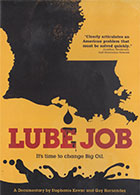
Lube Job: Time to Change Big Oil 2015
Distributed by The Video Project, PO Box 411376, San Francisco, CA 94141-1376; 800-475-2638
Produced by Stephanie Kovac and Guy Hernandez
Directed by Guy Hernandez
DVD, color, 89 min.
High School - General Adult
Ecology
Date Entered: 05/19/2016
Reviewed by Jim Hobbs, Online Service Coordinator, Monroe Library, Loyola University, New Orleans, LAA small shrimp boat glides down a channel, wind-blown nets billowing on either side, as it passes a large cargo ship. The cargo ship then passes silently, a vast, seemingly endless bulk. The opposition between tiny and local versus gigantic and global is the dominant comparison of this muckraking film. Shrimpers, ex-governors, biologists, attorneys, and Tulane Law professors all say the same thing: Louisiana's bargain with the oil industry has switched from money for oil to money for land, and we're also losing a way of life, hurricane protection and seafood.
Shrimper Tim Melancon describes his life as closely linked to the water and the land and the life therein and how it all seems to be coming to an end, as the marsh grows saline and the land disappears beneath the waves. There is background on the Cajuns and the oil industry in south Louisiana. Multiple causes for land loss are provided: salt water intrusion from over 15,000 miles of navigation canals dug by petroleum companies, introduced nutrias eating vegetation that holds the soil, and oil company waste liquids, water mixed with other, toxic substances, in permeable pits. This film places the majority of blame firmly on the oil companies in complicity with the state government. A pair of countering voices comes from a former Shell Oil president and a former Louisiana state legislator. Many factors stand in the way of successful remediation: Louisianans debt to the petroleum and gas industry, which may explain why there is such reluctance to regulate it, oil company ownership of swaths of wetlands, and state ownership of flooded land leading to income from mineral rights as ownership passes from private to public hands. Currently efforts to restore land depend on diverting the Mississippi's sediment to the marshes, but one commentator points out it took 7000 years to create the current delta. The film is full of scenes of great beauty and great devastation, from Spanish-moss draped cypress swamps to salt-contaminated ground, with optimism and pessimism side by side. The 2010 British Petroleum Macondo well disaster is included, its resulting contamination of much of the Gulf of Mexico and a cleanup that may have caused its own problems, and a suit by a government agency against the oil companies for remediation of the last century's damages.
This film has its flaws though they do not detract from its message. The English-language subtitle track has copious errors omitting words and personal and place names. For many users, however, the Cajun accent will require subtitles. Background music is guitar music rather than indigenous fiddle and accordion, though fiddler Roland Cheramie and his band do appear briefly. There are some unsubstantiated allegations, like Tim's self-described loss of memory.
Environmental peril crosses the nation, from flooded coastal cities due to polar ice melt from global warming to man-made earthquakes from fracking, but Louisiana's wetlands could completely disappear in 50 years leaving New Orleans a coastal city. During the writing of this review, cover stories appeared in the New Orleans Advocate and the New York Times about the continued loss of land and its consequences. Issue fatigue may set in for those outside Louisiana, but this problem continues to affect the state, the region and the entire country.
Awards
- International Award of Excellence, International Film Festival for Environment, Health and Culture, Indonesia
- Award of Excellence, Documentary Feature, Accolade Global Film Festival
- Award of Excellence, Nature/Environment/Wildlife, Accolade Global Film Festival